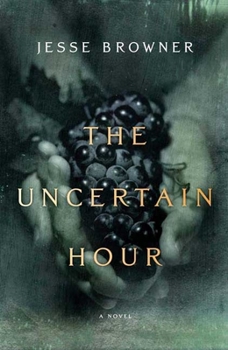The Uncertain Hour
a.d. 66: Having been falsely implicated in a plot to assassinate the emperor Nero, Titus Petronius has a choice: await the executioner at dawn, or die a noble Roman death by his own hand. Deciding... This description may be from another edition of this product.
Format:Hardcover
Language:English
ISBN:1596913398
ISBN13:9781596913394
Release Date:May 2007
Publisher:Bloomsbury Publishing PLC
Length:217 Pages
Weight:0.90 lbs.
Dimensions:0.8" x 5.8" x 8.5"
Customer Reviews
4 ratings
Life as a banquet
Published by Thriftbooks.com User , 16 years ago
Jesse Browner imagines the final hours of Titus Petronius Niger, the emperor Nero's "arbiter of elegance," in this convincing novel of ancient Rome. Knowing he has fallen out of the emperor's graces and will be tried and sentenced to death on the first day of the Saturnalia festival, Petronius holds a banquet for his closest friends and, true to Roman honor, plans to kill himself at the dinner's conclusion at dawn. Browner tells the tale from Petronius's perspective, focusing on his memories, regrets, concerns about his legacy, and meditations on his life: What is the good life? Is there meaning to life? To death? Browner can be lyrical, as when describing the sea or the sky, but he is occasionally ham-fisted; for instance, when Petronius asks his slave girl what she would do if she were free, Browner writes that a bird flew into the villa and "would surely break its neck trying to get out again." Surely there's a less banal way to describe the perils of freedom? Yet he also produces unexpected descriptions that linger with the reader: the value of a certain ladle is "worth enough to change her life forever." Browner also succeeds in building tension as Petronius's suicide approaches. Petronius is no Hamlet and has no fears about what dreams may come. He resolves himself to his death, and in the end, so do we -- though, contra history, we might wish he could have lived on.
"You are a great, a GREAT Roman"
Published by Thriftbooks.com User , 16 years ago
The Uncertain Hour transported me into the Roman Empire: its food, its art, its poetry, its values. What better person to display the cultural bounty of Ancient Rome than Nero's "Arbiter of Taste"? Petronius's moral dilemmas and deathbed reminiscences are woven through a jewel box of Roman culture. I particularly enjoyed the Roman poetry--Browner chose translations that are beautiful in and of themselves. The book is particularly resonant at the moment, as America faces comparisons to the Roman Empire at the height of its power and arrogance. Petronius's fate at the hand of Nero, a truly "unitary executive," is food for thought.
"Arbiter of Elegance"
Published by Thriftbooks.com User , 16 years ago
This is a simply wonderful novel, allowing any reader with a historical interest the pleasure first of all of seeing ancient Roman life in startling concrete detail through the eyes of a remarkably sophisticated, witty person, Petronius, the Emperor Nero's Stoic/Epicurean ruler in matters of taste. As others have mentioned, the novel is principally set on the last day of Petronius' life at the special farewell banquet - honeyed dormice are among its delicacies - which he's arranged before his own suicide, himself having fallen out of Nero's favor owing to court intrigue. Interspersed are flashbacks which give the background of Petronius' chief relationships in life, those with his cryptic mistress Melissa and his hotheaded, emotionally free Spanish protege, the poet Martial. Even more pleasurable than the historical dimension is the human dimension of Petronius' life, his strengths and limitations, which Browner as philosophical novelist richly sets forth. As an emotionally reserved general who's spent much time in the provinces, Petronius is of the opinion that, though life should be lived well and nobly, public life at the courts of emperors offers much to endure and little to enjoy, and that a guardedness in such is, consequently, the path best followed. His private attachment to his mistress, though, for this very reason of his habitual tempermental reserve becomes one which, unfortunately, leaves too much unsaid. Their rapprochement towards the novel's end, after so much indirection, is credibly rendered and astonishingly moving. Set against Petronius' reserve, which we've seen colors even his private life, is the emotional openness, anger, and general imprudence of his adopted son of sorts, Martial. The handholding and goodbyes of these two wonderfully realized figures in the novel's final pages are also moving in the extreme. The epigraph of the novel anticipates Henry James' urging that one should above all actually "live," rather than choosing to get through life without having to experience its joys and pains. I think in recognizing Melissa's loyalty - a light shows she's waited up for him to assist in his final act - and in telling Martial that he loves him as a son, Petronius for all his philosophy comes to realize he's in fact experienced those two consolations of a life often nasty, brutish and short - love and friendship.
Surprisingly moving
Published by Thriftbooks.com User , 16 years ago
I found myself very caught up in this book, a depiction of Petronius's last day. Determined to die as he has lived, and condemned to death by Nero, he throws a final dinner party for his friends. Petronius's reflections on his life and what people and events have meant to him become absorbing and worthwhile fiction. How an author so young could fantasize what would go through a man's mind during his final hours is the true amazement here. I was reminded what Dracula said to Van Helsing, "For one so young you are very wise." A moving and lovely book.





